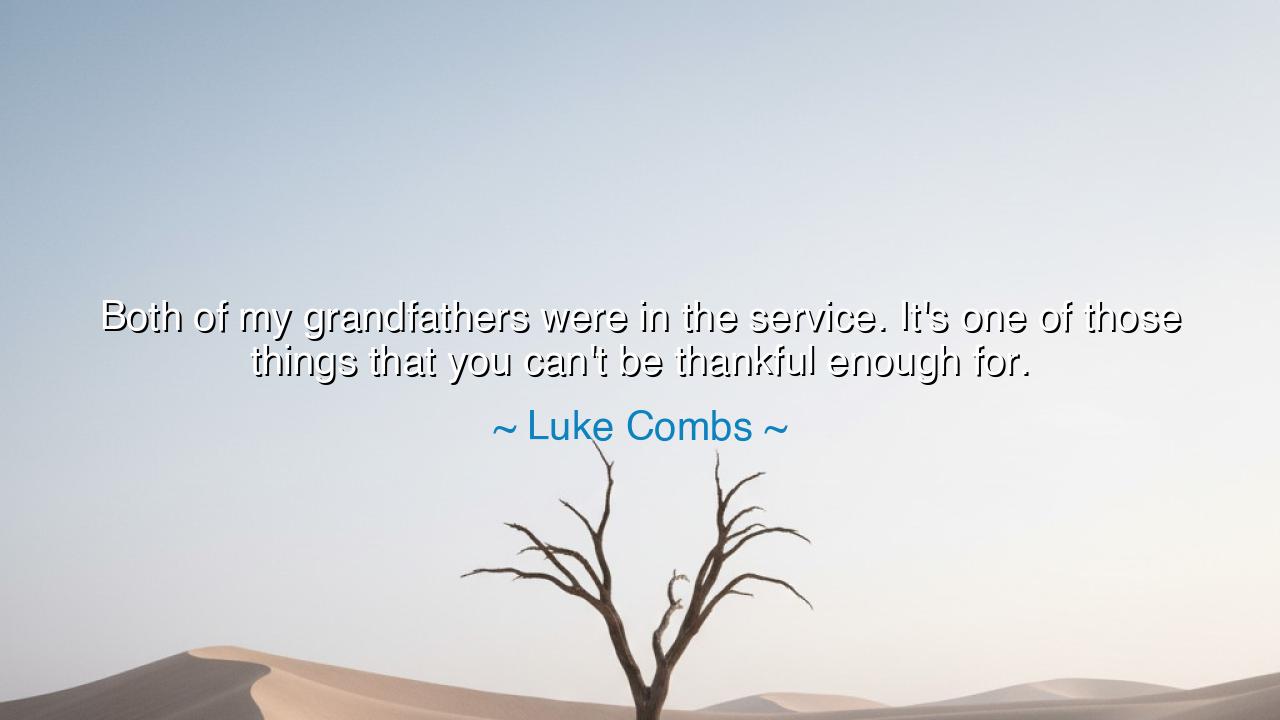
Both of my grandfathers were in the service. It's one of those
Both of my grandfathers were in the service. It's one of those things that you can't be thankful enough for.






The words of Luke Combs resound with the deep reverence of one who looks back upon his family’s roots with gratitude. When he speaks of his grandfathers in the service, he does not merely recount a fact of lineage — he utters a truth of sacrifice, of courage, and of inheritance. To say that it is “one of those things that you can’t be thankful enough for” is to acknowledge that there are debts which no gold, no praise, no earthly repayment can fully satisfy. Such debts are written in the blood of generations, in the long nights of worry endured by families, and in the countless acts of unseen bravery performed in silence.
The service he speaks of is not simply a profession but a calling — the willingness to stand between danger and the innocent, to guard the fragile light of peace with one’s own life. His grandfathers, by stepping into this sacred duty, became part of an ancient brotherhood of defenders that stretches back to the hoplites of Greece, the legionnaires of Rome, the samurai of Japan, and the soldiers of every land who bore arms for the sake of their people. To be the descendant of such men is to carry a weight, but also a crown.
History bears countless echoes of this truth. Recall the story of Dwight D. Eisenhower, whose own family had deep ties to the military. Though he himself rose to become a general and later a president, he never ceased to speak with humility about the sacrifices of the common soldier, men whose names would never be etched into marble but whose deeds preserved the freedom of nations. Like Combs’ grandfathers, these were men whose service became the quiet foundation upon which others could build their lives in peace.
What Combs teaches us through his words is the necessity of thankfulness. Too often, the sacrifices of those who serve fade into the background of daily life. The child plays in the yard, unaware that such freedom was bought at a high price. The singer raises his voice, yet behind his song lies the silence of men who endured battlefields so that music might once more be heard in peaceful lands. Gratitude, when spoken from the heart, becomes an act of remembrance, a way of keeping the legacy of sacrifice alive.
Yet gratitude is not enough if it remains only in words. To honor those who served, one must live in a manner worthy of their sacrifice. The ancient Romans called this virtus — to embody courage, justice, and discipline in one’s own life. For every man or woman who lays down their life or their youth in service, there must be descendants who rise with integrity, who carry forward not only the memory but the spirit of what was given. In this way, the chain of sacrifice is not broken but transformed into the chain of character.
Think of the countless families who hold stories similar to Combs’. A grandfather who stormed the beaches of Normandy, a grandmother who worked the factories to supply the war effort, a father who endured the jungles of Vietnam, or a mother who braved the deserts of Iraq. Their deeds may differ, but the thread that binds them all is the same: the willingness to give of themselves for something greater. When we reflect upon these stories, we are reminded that the true inheritance of such families is not wealth, but duty and honor.
Therefore, let the lesson be this: be thankful not only with words, but with the life you live. Seek to be courageous in your own struggles, to protect the weak in your community, to build rather than to destroy, and to honor your family’s sacrifices by carrying them as a light within your soul. If you descend from those who served, do not let their deeds be forgotten; and if you do not, still bow your heart in gratitude, for their service sheltered you as well.
And so, O children of the present, remember always the saying of Luke Combs: some gifts are beyond repayment, yet they demand our deepest gratitude. Honor those who served by the way you live, cherish their memory, and let thankfulness shape your days. For in remembering them, we not only keep faith with the past but also prepare the ground for a nobler future.






AAdministratorAdministrator
Welcome, honored guests. Please leave a comment, we will respond soon